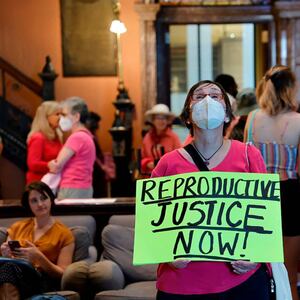The Rev. Patrick Mahoney ditched his usual jeans and Converse for the dark blue suit and the brown shoes he considers bougie before boarding the Amtrak in Washington D.C., to New York City last March. He wanted to look presentable for the speech he’d be giving at the New York mayor’s interfaith anti-gun violence summit. But he also needed to blend in with the other suits as he later entered an office building in Midtown Manhattan off of Fifth Avenue. Briefcase in hand, the Presbyterian minister walked confidently past the empty lobby, mashed the elevator button, and slipped inside.
He had another mission, and it had nothing to do with guns.
But the elevator ride ended anticlimactically on a floor with what looked to be an empty office space. The other potential address he had for his target was for the adjacent building. This time, the pastor would have to get past a security guard before riding up to what he hoped were the secret headquarters of Danco Laboratories, a U.S. distributor of the abortion drug mifepristone.
The elusive pharmaceutical company has long captured the fascination and ire of anti-abortion extremists like Mahoney.
“I said, ‘Oh, my wife’s looking to do a story on Danco. She is a certified health coach; can you check again?’” Mahoney told The Daily Beast of his ruse with the security guard that day. In a partial omission, he said he referred to his wife—also a well-known anti-abortion activist—by her maiden name.
“Katie has written some stories not favorable to Danco by any means,” he later explained to The Daily Beast.
Leading up to the fall of Roe v. Wade last summer, activists and Republican politicians fought to restrict and ban abortion via medication, which has become the most popular and increasingly accessible way to terminate a first-trimester pregnancy in America. And the Food and Drug Administration’s recent rule change allowing retail pharmacies to provide the abortion drug mifepristone directly to patients has only heightened abortion opponents’ urgency to disrupt access to these pills. National anti-abortion groups have already announced upcoming protests at CVS and Walgreens, which have agreed to obtain certification to dispense the drug.
Mahoney, meanwhile, has been on a nearly year-long mission to get closer to the source of these abortions—to uncover and obstruct Danco, a sort of holy grail for anti-abortion fanatics.
Born in May 1954, the pastor tells people he’s 69, aging himself by about nine months, when he was conceived, which is when most abortion foes insist a person’s life begins. He grew up in the radical “rescue” wing of the movement of the 1980s and 1990s, getting arrested at least 100 times, he claims. For about a decade, he served as the spokesperson for Operation Rescue, whose followers formed human chains to block abortion clinic entrances. This militant wing attracted violent extremists, some of whom murdered doctors and clinic workers.
Now, Mahoney is the chief strategic officer for the Stanton Public Policy Center, the lobbying arm of Stanton Healthcare, a network of crisis pregnancy centers headquartered in Idaho. Like similar centers around the country, they are faith-oriented and work to dissuade women from having abortions, but unlike many centers that primarily offer free pregnancy tests and diapers, Stanton’s offer limited reproductive and sexual health services but no birth control or abortion. Anti-abortion activist and Idahoan Brandi Swindell founded and runs Stanton (and also dates Republican U.S. Rep. Russ Fulcher of Idaho, who has advocated for and has done press appearances with Stanton).
Swindell’s position is that all abortions are bad, but she refers to mifepristone, which works by blocking the progesterone hormone that a pregnancy needs to thrive, as a “human pesticide.” And she compares Danco to Monsanto.
The only difference—and a big problem for a movement with a long legacy of harassing patients and providers outside of clinics—is that Danco is impossible to find.
“Like, why are they being so secretive? Why are they in such hiding?” Swindell asked The Daily Beast. “And so for us, you know, we did want to understand who was profiting. Who’s the principal behind manufacturing the abortion pill, what kind of sweetheart deals are there?”

Brandi Swindell, founder and CEO at Stanton Healthcare, testifies before the Senate Health, Education, Labor and Pensions Committee on Capitol Hill, July 13, 2022 in Washington, D.C.
Kevin Dietsch/Kevin Dietsch/Getty ImagesMahoney said the friendly security guard on Fifth Avenue last March told him there was no Danco in the building—and told the same thing to the private investigator Stanton hired months later to expand his search. Mahoney claimed he found the investigator through a former federal law enforcement pal from his suburban Virginia church.
“We have no idea whom to reach out to and I am sure with your experience, you know some credible ones. (Not the crazy drunk PI’s you see in movies!),” Mahoney wrote in an email he shared with The Daily Beast, though he declined to reveal the names of the individuals he enlisted for this project. “We need to have the exact location to hold prayer and candlelight vigils along with peaceful public events. It would be pretty embarrassing if we held a prayer vigil in front of a corporation that made screwdrivers!”
“Yeah, that’s not where we are located,” Danco spokesperson Abby Long—currently the only publicly identified employee of the pharmaceutical company—told The Daily Beast regarding the addresses Mahoney tried.
She said Danco is, in fact, headquartered in New York—but at an unlisted location—with its drugs manufactured in Europe. All the secrecy, she said (which has been approved by the FDA), is to keep anti-abortion extremists out of her workplace. Long has been at the 23-year-old pharmaceutical company for the past 16 years. She recalls her two predecessors receiving the occasional aborted fetus postcard mailed to Danco’s publicly listed P.O. box.
Otherwise, she said, harassment has been minimal.
“You know, every once in a while, when I very first started, there might be an occasional email that would pop through our general email,” Long told The Daily Beast. “There was no life-threatening, ‘I’m watching you and going to kill you’ kind of thing. It was more just like, ‘You’re bad people and God knows it.’”
Danco Laboratories formed in the first place because other pharmaceutical companies were not willing to wade into the abortion controversy and market mifepristone, which Danco has distributed as Mifeprex for the past two decades. In 2019, the FDA approved a generic version of the drug distributed by GenBioPro, which similarly keeps its company details private.
As part of the FDA’s approved two-step abortion medication regimen, mifepristone is taken in conjunction with a second drug called misoprostol within the first 10 weeks of pregnancy. With the new rule, patients will still need a prescription to obtain the drugs, and can still only do so in states where abortion remains legal. Hoping to set up additional roadblocks, anti-abortion activists and lawmakers are frantically working in the background to figure out how to block abortion pills from being mailed across state lines, and how to ban interstate travel. Alabama’s attorney general has controversially suggested women could be prosecuted for taking abortion pills.
Following the FDA’s announcement, Mahoney said his email group of major anti-abortion leaders started blowing up with breathless suggestions of how to scare pharmacies out of dispensing these drugs, suggesting boycotts and pickets and sit-ins.
The text of one email Mahoney sent to the anti-abortion listserv, which he shared with The Daily Beast, outlined a specific strategy to win a boycott campaign. “Focus in on JUST ONE national chain. Pick the one that is in the weakest financial position.” Mahoney wrote. “Focus on the chain that has the most locations in the pro-life leaning states. Direct action and peaceful protests and local pharmacies. In other words, treat each pharmacy like an abortion clinic.”

Rev. Patrick Mahoney, director of the Christian Defense Coalition, kneels in prayer as he livestreams a Good Friday service on the grounds of the U.S. Capitol on April 10, 2020 in Washington, D.C. Amidst the COVID-19 pandemic, Christians around the globe will mark the Easter holiday on Sunday, April 12.
Drew Angerer/Getty ImagesFor now, Stanton Public Policy Center has tabled its wild goose chase—finding Danco’s HQ—to focus on disrupting access to medication abortion. The group has planned a demonstration at a CVS in Northwest Washington, D.C. next Wednesday afternoon. Different groups have announced protests at various CVS and Walgreens locations all over the country on Feb. 4 and at Walgreens’ headquarters in Deerfield, Illinois, on Valentine’s Day.
This is all before pharmacies have actually begun dispensing the medication. That will be a lengthy process. After all, pharmacies have to get specially certified to do so, which University of California at San Francisco professor and reproductive-health researcher Ushma Upadhyay wrote in a recent Los Angeles Times op-ed is medically unnecessary, given the drug’s high safety record, which she notes exceeds drugs like Tylenol and Viagra.
“Pharmacies dispense thousands of other medications every day without needing a specific certification for each one,” Upadhyay writes. “It is just another hurdle and hassle that will deter pharmacies from selling this essential medication.”
And, of course, not all of the participating pharmacies will be public about it. “We want to be able to put the information out there so that folks can figure out where they need to go, but we also want to be respectful of those who want to be confidential in some form or another,” Long said.
Walgreens spokesperson Marty Maloney told The Daily Beast the pharmacy chain has no comment regarding the planned protests, but in an emailed statement, he said, “We intend to become a certified pharmacy under the program. We are working through the registration, necessary training of our pharmacists, as well as evaluating our pharmacy network in terms of where we normally dispense products that have extra FDA requirements, and will dispense these consistent with federal and state laws.”
CVS did not respond to a request for comment. But spokesperson Amy Thibault recently told Catholic News Agency, “We plan to seek certification to dispense mifepristone where legally permissible,” and, “We have policies in place to ensure no patient is ever denied access to medication prescribed by a physician based on a pharmacist’s individual religious or moral beliefs.”
While the militant activists make noise with their protests and boycotts, the anti-abortion movement’s legal and policy advocates are hard at work in the courts and legislatures trying to get the FDA to revoke its approval of mifepristone. They also want state lawmakers and congressional lawmakers in the newly GOP-controlled House to introduce new onerous regulations surrounding medication abortion. Swindell says her group has been talking to lawmakers about requiring pharmacies to give patients information about alternatives to abortion. Anti-abortion groups have also been exploring how to use environmental laws to create more hurdles for people trying to terminate their early-stage pregnancies.
For its part, Danco will continue to try to remain far out of these militants’ reach.
“The anti-abortion movement has historically been fairly aggressive, in both kind of their reaction and response to, you know, what the abortion community is doing as a whole,” Long said. “We want to be able to just do the business that we do.”










